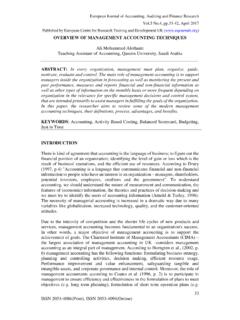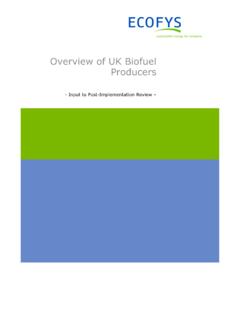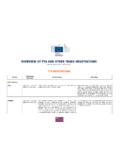Transcription of The UK Pharmaceutical Sector An Overview - Global Ambition
1 Part of the Evolve UK seriesThe UK Pharmaceutical SectorAn OverviewEnterprise Ireland is the Irish Government s trade and innovation agency. It invests in the most innovative Irish companies through all stages of their growth and connects them to international customers across multiple industries. Our goal is to build successful, long-term business relationships between Irish companies and international partners. With offices worldwide, Enterprise Ireland s teams of industry experts consult with international businesses to understand and solve their business UK remains the largest export market for indigenous Irish Companies.
2 Enterprise Ireland supports Irish companies in the UK from offices in London and Manchester with Market Advisors across a wide array of sectors from construction to digital. Enterprise Ireland has commissioned Shibumi Consulting Limited to provide an Overview of the UK Pharmaceutical report was completed in December 2019 and the information was collated using online searches and information available in the Enterprise Ireland Market Research Centre (MRC) at East Point, Dublin. A full list of sources used appears in the Appendix of this report. Contact Laura BrocklebankSenior Market Advisor 161 638 8717 Kevin Fennelly Market 161 638 8716 Enterprise IrelandLowry House17 Marble StreetManchesterM2 IrelandUK Pharmaceutical Sector OverviewContentsOverview - Facts & Figures.
3 2UK Pharmaceutical Industry Characteristics .. 3 Pharmaceutical R&D Process .. 4 Market Overview .. 6 Challenges .. 7 The Rise of Generics .. 7 Brexit .. 8 Opportunities .. 9 Key Trends .. 11UK Pharmaceutical Clusters .. 12 Top 50 UK Pharmaceutical Companies Rank 1-25 .. 15 Top 50 UK Pharmaceutical Companies Rank 26-50 .. 16 Active UK Pharmaceutical manufacturing sites .. 17 Key Conclusions .. 19 Company Profiles .. 20 Appendix .. 34 List of Organisations and Associations .. 35 Pharmaceutical Companies by UK Region .. 36UK Pharmaceutical Contract Manufacturing Companies .. 52 Members of the British Generics Manufacturing Association.
4 53 List of UK Pharmaceutical Eudra GMP Compliant Companies .. 55 Additional Market Information .. 67 Partnerships, Mergers and Acquisitions .. 68 Health Expenditure .. 69 Drugs & Medicine Exports by Country .. 692 Overview - Facts & FiguresThe UK Pharmaceutical Sector is a major Global centre for the production of pharmaceuticals and is critical to the UK to the O ce of National Statistics, 610 enterprises operated in the UK Pharmaceutical Sector in 2018. The UK Pharmaceutical Sector employs approximately 63,000 people and generates a market value of around 21bn. Two of the world Top 15 Pharmaceutical companies are head quartered in the UK, namely GlaxoSmithKline (GSK) and Astra all the Pharmaceutical products produced in the UK, 41% are exported, 30% are for the UK market and the remainder (28%)
5 Are substances that are used in the production of an other Pharmaceutical the period from 2018 to 2023, the UK Pharmaceutical Sector value is forecasted to increase by to 25bn, which equates to an annual growth of growth from2018 to 20232of Top 1563,000 Employess610UK Enterprises3UK Pharmaceutical Industry CharacteristicsThe Pharmaceutical Sector has a number of unique characteristics:Single Primary Customer & Fixed PricesThe industry has one primary customer, the National Institute for Health & Care (NICE) assesses new drugs, following which NICE makes recommendations to the NHS. The NHS then decides which drugs to include in the prescription system, which drugs to offer to patients free of charge.
6 Drug Assessment Criteria Efficacy Ease of use Side effects Value Proposition CostThe Department of Health negotiates a five year price agreement with branded medicine manufactures; this is the Pharmaceutical Price Regulation Scheme (PPRS).Heavy R&D investment & the importance of New Product Development (NPD) PipelineThe Pharmaceutical Sector invests heavily in R&D. According to the ONS, Pharmaceutical R&D accounted for 27% of all UK manufacturing R& of the UK Pharmaceutical industry employment is focused on R&D and specifically: Formulation discovery, development and clinical trials Drug delivery device R&D and manufacture40% of the UK Pharmaceutical Sector GVA comprises UK-based R&D Pharmaceutical industry is one of three technology-based industries in which the patent virtually equals the product.
7 The others are the chemical and biotechnology industry. The patented products of Pharmaceutical companies can be easily and cheaply replicated. Thus, patent exclusivity is the only effective way to protect and receive a return on that investment. The Pharmaceutical R&D process is very lengthy. It can take between 12 and 15 years and cost up to 1bn to develop one new drug. Supplementary Protection Certificates (SPCs) may be granted by the Court Justice of the EU (CJEU), for up to 5 years, however, in the US term extensions are available more easily which has resulted in a shift of R&D activity from the EU to the will be interesting to see if the UK introduces changes to patent extension rules post Brexit to increase attractiveness of the UK for Pharmaceutical R&D.
8 4 Pharmaceutical R&D ProcessClinical Trials Phase I Phase I Phase IIINew DrugApplicationApprovalLaunchDrugDevelop ment Pre clinical ResearchDrug Discovery10 15 YEARS3 6 years6 7 years1 2 years10,00025051 TimeNumber ofcompoundsR&D priorities are changing, due to: Regulatory & market environment changes Need to reduce time-to-launch Competitor & pricing pressureIn order to minimise investment risk: New therapies need to offer significant benefit over existing therapies Early accurate risk vs reward assessment is essential to evaluate whether to proceed or terminate with R&D Strong patient and payer based value proposition needs to be developed, to aid faster approval from payers5 One of the main Pharmaceutical R&D challenges in the UK is how to be more flexible in a highly regulated companies are making organisational changes to meet this challenge.
9 Three possible options are: 1. Forming of cross functional groups with: Commercial and R&D teams working together and sharing knowledge2. Focus on one/few treatment areas: Involve relevant medical community Build relationships with external experts to have access to knowledge and new technology Collaborations with academia for access to new ideas & talent3. Or, alternatively: M&AIn line with the above, KPMG predicts that in future three business models for Pharmaceutical companies are likely to emerge:Active Portfolio Company Active in several treatment areas Able to acquire and/or divest parts if the portfolioValue Chain Orchestrator Data-rich, using data to link supply and demand in Global healthcare systemsNiche Specialist Focusses on one treatment areas, looking at the complete patient pathway from prevention to cureWith the emergence of personalised / targeted medicine and treatment regimes, R&D activities clearly also need to be patient-focused.
10 The patient moves from being a passive recipient of treatment to becoming a central part of the R&D process for new therapies (Deloitte pharmaceuticalceutical R&D Leader Survey, 2017)This will help Pharmaceutical companies identify unmet patient needsThis in turn will create a positive cycle: Patient needs are better understood > Focused R&D activities on meeting unmet patient needs > Facilitates creation of strong value proposition, that satisfies payers and providers & is seen to offer value for money > Leads to a commercially successful product6 Market Overview1. The UK MarketThere are opportunities for companies who have the supply chain capability to sell into UK Pharmaceutical UK health budget in 2017/18 was , which represented an increase of over the previous strong domestic demand for Pharmaceutical products was due to the rising prevalence in chronic diseases.


